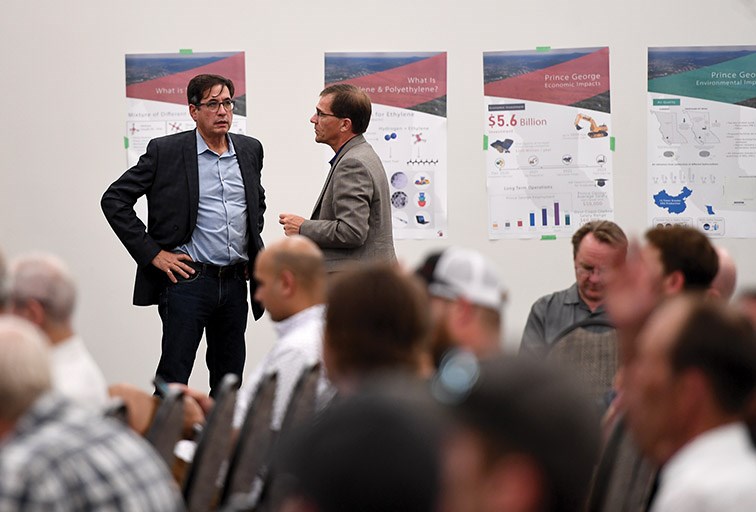The potential impact on the city's airshed became an issue when a open house for a proposed petrochemical plant was held Wednesday.
Long-time clean air advocate Dr. Marie Hay urged West Coast Olefins Ltd. to reconsider the BCR Industrial Site and instead give Hart North, another area designated for heavy industry, a closer look.
Citing a 2008 report, Hay said the city's airshed is now incapable of taking on any more heavy industry without compromising residents' health. The BCR's location in the Bowl combined with its proximity to Lower College Heights, makes it the wrong spot, she said.
Located about 30 kilometres north of the city, the 585-hectare (1,445-hectare) Hart North site was identified in 2010 as the preferred spot to get heavy industry operations such as pulp, steel and sawmills, oil refineries and wood pellet plants outside of Prince George's airshed.
"Now I am not against development, I am not against jobs. What I am saying is that Hart North has been identified as the place to develop heavy industry, which this is," Hay said.
In response, WCOL CEO Ken James said the spot was considered but deemed unrealistic because it would effectively entail starting up a new industrial park rather than using an old one.
"I tell you, one of the things I wouldn't do is if this isn't good enough for the city, that we would move it up to the Hart. That's not a message I want to condone in any way," James also said. "This needs to be good for any part of the city."
James maintained that the amount of particulate emitted by the plant would be negligible but Hay countered that particulate is not the only issue, saying it will also emit cancer-causing benzene and volatile organic compounds and could pollute the immediate area with microplastics.
Hay pointed to examples from other operations in Alberta and Sweden to support her position and James countered that they're older operations that had lacked the up-to-date technology to address those issues.
About 150 people showed up for the first of a couple two-hour sessions held at Uda Dune Baiyoh Hall. James devoted roughly 40 minutes to providing an outline of WCOL has in mind for 120 hectares (300 acres) in the BCR that was previously home to a gravel pit and log sort yard.
At a cost of $5.6 billion, the aim is build an ethylene plant to produce one million tonnes per year of polymer-grade ethylene and a polyethylene plant that would, in turn, convert most of that ethylene into raw plastic for shipment to Asia to make finished products.
Natural gas taken from Enbridge's West Coast pipeline would be the raw material. A recovery plant would be built alongside the pipeline to retrieve the gas and pipe it to the plant.
James made note of the October 2018 blast at Shelley that forced members of the Lheidli T'enneh to evacuate, crossing another section of the pipeline in the process. He said steps will be taken to avoid a similar event on the WCOL system.
James also noted Enbridge is in the process of upgrading its compressors along the line to the north but was unable to say whether it will increase the flow beyond the current 80 per cent or build a new line to meet WCOL's demand. Enbridge's next steps will depend largely on what the Transportation Safety Board concludes following its investigation of the blast, he speculated.
As many as 5,000 people will be employed at peak construction and about 1,000 will be on the plant's payroll once up and operating, according to information posters placed on the hall's walls.
Hay was pretty much the lone voice of concern during the session as others stood up to express support during a question and answer period. The proposal remains subject to a review by the B.C. Environmental Assessment Office.
Pending EAO approval, a final investment decision is to be made at the end of 2020, with construction to begin in spring 2021 so it is in operation by the end of 2023. James called the timeline tight but "doable and necessary."



